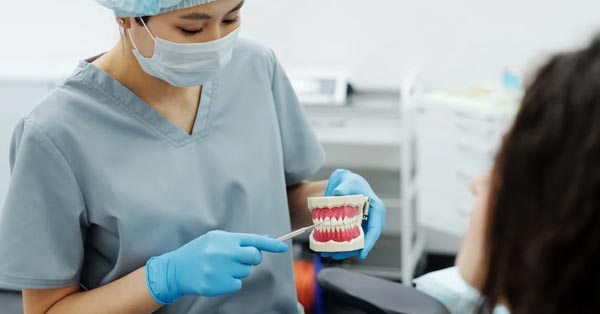A Guide to Common Dental Problems
By: Sally Solo, Real Simple
Keep this guide to common dental problems handy so you'll achieve the perfect smile everybody would want to see! The Oral Surgery DC Team
How to prevent or treat the (sometimes painful) troubles that can lurk in your mouth.
Problem: Tooth Decay
Also known as dental caries or cavities, tooth decay occurs when plaque, a sticky film of bacteria that forms when you eat sugars or starches, is allowed to linger on teeth for too long.
Who's at risk: Anyone can get a cavity, but children and older people are the most prone. The incidence among children has been declining, thanks to community water fluoridation and the increased use of fluoride toothpastes, but "more than half of all children have cavities by the second grade," according to the U.S. Department of Health and Human Services report Healthy People 2010. Older adults are prone to cavities at the root because protective gum tissue often pulls away.
What to do: Don't give plaque a chance: Brush with a fluoride toothpaste and floss every day. Children can also benefit from sealants (plastic coatings applied to the chewing surfaces of their back teeth) as soon as their adult molars come in. Older people should be particularly vigilant: "Those who have a tendency toward dry mouth should receive regular fluoride treatments from a dentist and use a fluoride-containing mouth rinse," says Bruce Pihlstrom, D.D.S., acting director of the Center for Clinical Research at the National Institute of Dental and Craniofacial Research (NIDCR).
Problem: Gum Disease
A bacterial infection caused by plaque that attacks the gums, bone, and ligaments that keep your teeth in place. The early stage is known as gingivitis, the advanced stage as periodontitis.
Who's at risk: Everyone. The National Institute of Dental and Craniofacial Research (NIDCR) estimates that half of all adults have some signs of gingivitis. Most at risk are people with poor oral hygiene; those with a systemic disease, such as diabetes, that lowers resistance to infection; and smokers. Women also have a tendency to develop gingivitis during pregnancy. Other risk factors are stress, which weakens the immune system, and genes. "Some people can have gingivitis all their lives and never progress to periodontitis," says Bruce Pihlstrom, D.D.S., acting director of the Center for Clinical Research at the NIDCR. "It depends on a person's susceptibility to the disease."
What to do: See a dentist regularly, and tell her if your gums feel tender or bleed. Gingivitis can be reversed with regular brushing and flossing. To combat periodontitis, a dentist or periodontist may perform a deep cleaning around the teeth and below the gum lines and prescribe medication to combat the infection. If the disease has progressed to affect your gums and bone, your dentist might suggest surgery, such as a gum graft.
Problem: Tooth Infection
The pulp inside the tooth (which contains nerves) is damaged or becomes infected because of decay or injury. The root canal, which connects the top pulp chamber to the tip of the root, may become infected, too.
Who's at risk: Anyone with a deep cavity or a cracked tooth, which can let in bacteria. An injured tooth can have a problem even if it's not visibly cracked or chipped.
What to do: If you feel pain in or around a tooth, see your dentist. He may refer you to an endodontist, who specializes in root-canal procedures. In one to three visits, the dentist will perform the notorious root canal (which is much less painful than it used to be). He will remove the pulp, clean the pulp chamber and root canal, then fill the tooth. Finally, he may seal the tooth with a porcelain or gold crown.
Problem: Enamel Erosion
Exposure to acid, primarily from soda or citrus drinks, can wear down the surface of the teeth, making them rounded and discolored. Overbrushing can have a similar effect on enamel near the gum lines.
Who's at risk: Anyone who sips lemonade, soda (even diet soda), or sports drinks all day. This is also an occupational hazard of wine professionals. "I see people with good home care who are getting cavities," says Cindi Sherwood, a dentist in Independence, Kansas, and a spokesperson for the Academy of General Dentistry. "A lot of times the only risk factor we can come up with is diet soda." Aggressive brushers may also be wearing away the enamel along with the plaque.
What to do: If necessary, teeth can be restored with bonding materials. But to prevent further damage, you have to change your habits. If soft drinks are the culprit, for example, switch to water. Second, best is to drink sodas (or sports drinks) with a full meal or sip them through a straw, then follow with a tooth brushing, sugarless gum, or a good swish of water in the mouth. If the problem is overbrushing, a soft-bristled brush or an electric toothbrush is a start. A dentist or a hygienist can demonstrate proper, gentle brushing technique.
Problem: Dry Mouth
Also known as xerostomia, dry mouth results from a decrease in the flow of saliva in the mouth. It is extremely uncomfortable and increases the chance of tooth decay since saliva helps wash away harmful bacteria.
Who's at risk: Those who take any of 400-plus medications, including diuretics and antidepressants. "Dry mouth becomes more prominent as women get older, in their 50s and 60s," says Sally Cram, an American Dental Association consumer adviser and a periodontist in Washington, D.C. Hormonal and metabolic changes that come with age can also change your salivary flow. Another cause is Sjogren's syndrome, a rare disorder most common among women in their late 40s that causes a person's immune system to attack her salivary and tear glands.
What to do: Keep sugarless gum on hand; avoid caffeine, tobacco, and alcohol; and drink plenty of water. Artificial rinses or moisturizing mouth gels can help the salivary glands function. If you suspect that you have dry mouth, see your dentist or doctor. "Anyone needing additional fluids to speak or to swallow dry foods for three months or longer should be evaluated for Sjogren's," says Jane Atkinson, D.D.S., deputy clinical director of the National Institute of Dental and Craniofacial Research (NIDCR). While there's no cure, she says, "as with lupus or rheumatoid arthritis, you can manage it."
Problem: Temporomandibular Joint Disorder (TMJ)
TMJ is a group of conditions that affect the temporomandibular joint, just below the ears and above the jaw. Sufferers may clench or grind their teeth subconsciously, often at night.
Who's at risk: About twice as many women as men are believed to have TMJ, most commonly during their childbearing years. People who are under a great deal of stress are also more prone to it, or a severe injury to the jaw may cause the condition. It's usually not chronic, though it can become so. TMJ can lead to worn-down and sensitive teeth, as well as other painful symptoms, such as a sore jaw, headaches, neck aches, and earaches.
What to do: See your dentist if you feel pain when you chew, find that your jaw has limited movement, or have radiating pain in your face, neck, or shoulders. Treatment may be as simple as relaxation exercises, cold compresses, ibuprofen, and avoiding foods that require serious chewing. To train yourself to stop clenching and grinding your teeth, the Mayo Clinic recommends "resting your tongue upward with your teeth apart and your lips closed." To stop nighttime grinding, your dentist can fit you with a mouth guard.
Problem: Oral Cancers
Oral cancer may start with a small, pale, red, painless lump on some area of the mouth. A dentist can easily screen for the disease by examining and feeling around a patient's mouth, head, and neck.
Who's at risk: Of the estimated 30,000 cases of oral cancer diagnosed each year in this country, about three-quarters are associated with tobacco use or tobacco in combination with heavy alcohol use. Most cases occur after age 40. Many people aren't screened, and detection usually occurs when the cancer is at an advanced stage. That's why the five-year survival rate is one of the lowest for all cancers.
What to do: Stop smoking, and make sure your dentist screens you every time you visit. Even people missing many or all of their teeth should see a dentist regularly to make sure their dentures fit, as chronic irritation can be a risk factor.






4.9 Stars
based on 134 reviews
5 Stars
based on 11 reviews
5 Stars
based on 11 ratings